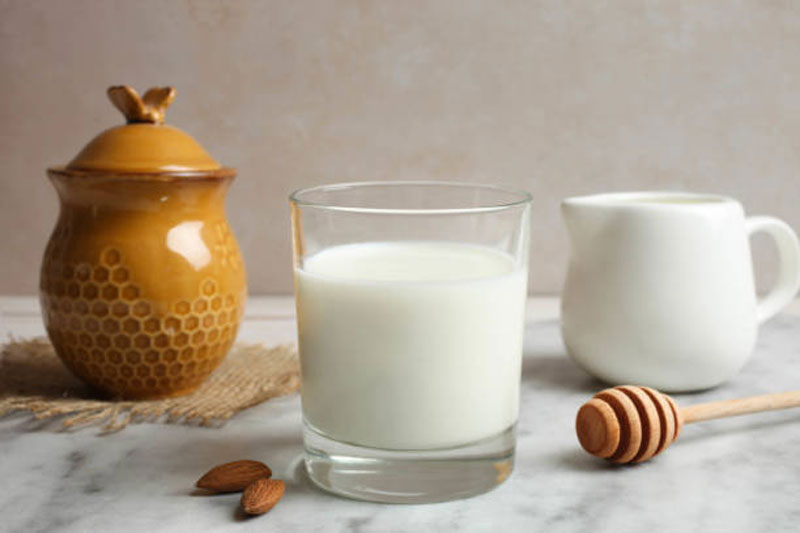
Here are five foods to help you grab a blissful night of shut-eye.
Almonds
Almonds contain high doses of melatonin, a hormone that helps to regulate our sleep-wake cycle.
Research suggests eating almonds can alleviate insomnia. A 2016 study found that rats fed extract of almond spent more time in the deeper stages of sleep. And a 2019 study found that consuming 10 sweet almonds a day for two weeks reduced insomnia in a group of more than 400 students.
Milk and Honey
Many sleepers swear by having a glass of warm milk before bed, and adding dollops of honey may do more than just make it sweeter.
A 2018 study gave patients in coronary care units a milk-and-honey mixture twice a day, along with a control group who received none. After three days, researchers measured their sleep quality and found that the patients who drank the mixture had better sleep scores than the control group.
Herbal Tea
If warm milk isn’t to your taste, perhaps you’ll consider a cup of herbal tea instead.
A 2018 study examined subjects with prolonged fatigue, a tea group and a control group. The tea group drank herbal tea twice a day for 8 weeks, and both groups were assessed at 4 weeks and 8 weeks. The tea group showed less fatigue and better sleep quality at both check-ups.
Just be sure you check the tea’s low on caffeine. Green tea, for example, has 25 to 29 milligrams of caffeine (for comparison, black tea has 25 to 48 milligrams).
Oysters
An unusual choice for a bedtime snack, but the science backs it up. Oysters contain high amounts of zinc, which helps regulate sleep.
A 2017 study examined 120 subjects who were divided into four groups —a placebo group, a group eating zinc-rich food, a group eating zinc- and astaxanthin-rich foods (such as seafood), and a placebo supplanted with zinc-enriched yeast and astaxanthin oil.
The group eating zinc-rich foods fell asleep faster, as did the zinc-enriched yeast and astaxanthin oil supplanted group. The zinc-rich food group also slept better.
Other zinc-rich foods include red meat, other shellfish, legumes, eggs, milk, cheese, whole grains, nuts, and seeds.
Fiber-Rich Foods
A 2016 study found that a low fiber diet, along with consuming a lot of saturated fats and sugars, reduced sleep quality and caused sleepers to wake up in the night. Conversely, eating greater amounts of fiber increased time spent in slow-wave sleep, a stage thought to help with brain maintenance and recovery.
High-fiber foods include apples with their peels, raspberries, bananas, oranges, strawberries, carrots, broccoli, artichokes, potatoes, beans and other legumes, nuts, seeds, and whole grains.
Foods To Avoid
The flip side of the best foods to eat before bed —the worst foods to eat before bed. If you want a good night’s sleep, we recommend avoiding:
- Chocolate: Remember the 2016 study that found that high amounts of saturated fat and sugar reduce your amount of restorative sleep? Plus, chocolate has trace amounts of caffeine, which may keep the caffeine-sensitive up past their bedtime.
- Anything caffeinated: Probably one you already knew, but still worth mentioning. You may not know, however, that caffeine disrupts sleep up to six hours before bed.
- Heavy meals or spicy food: Eating either can trigger heartburn, and the discomfort may cause sleep to elude you. Try to eat your last big meal at least 2 to 3 hours before bed, and stick with light snacks after that time has passed.
Eating Well for Better Sleep
Sleep is important for your health, and eating well can improve your sleep habits. Avoid eating right before bed, though, and instead, give yourself a couple of hours to digest your food. Consider getting a memory foam mattress if you want to sleep better. And stick to a set bedtime every night, as following a schedule will help you develop a good sleep routine.
Author: Stacy Liman,
Follow her on Twitter: @stacyliman, https://twitter.com/stacyliman
Comments
comments